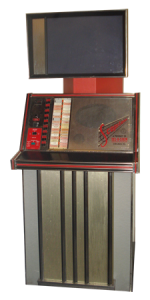 The Scopitone is a type of video jukebox that plays 16 mm films. The Scopitone films were the forerunner to the modern music video. The Scopitone player was the size of a refrigerator and played color films and, like a conventional jukebox, the customer was able to choose which video to watch from the selection of videos loaded on the machine.
The Scopitone is a type of video jukebox that plays 16 mm films. The Scopitone films were the forerunner to the modern music video. The Scopitone player was the size of a refrigerator and played color films and, like a conventional jukebox, the customer was able to choose which video to watch from the selection of videos loaded on the machine.
Based on technology developed during World War II, color 16 mm film clips with a magnetic soundtrack were designed to be shown in a specially designed jukebox. The first Scopitones were made in France and later spread to West Germany and went on to appear in bars in England.
Scopitone USA
In 1963, George Wood of the William Morris Agency in New York City devised a development deal to license the machines throughout the U.S. and importation of the French machine to the U.S. was begun in the Spring of 1964 with the organization of Scopitone, Inc.
By 1964, aftermarket testing in Miami and Miami Beach, the devices proved to be so popular and resulted in so many requests for installation that soon the northeast part of the US was inundated with the novelty. By mid-1964, approximately 500 machines were installed, mostly in upscale resort hotels, cocktail lounges and fancier downtown restaurants.
Several well-known acts of the 1960s appear in Scopitone films, however, ranging from the earlier part of the decade The Exciters (“Tell Him”) and Neil Sedaka (“Calendar Girl”) to Procol Harum (“A Whiter Shade of Pale”). In one Scopitone recording, Dionne Warwick lay on a white shag rug with an offstage fan urging her to sing “Walk On By”. Another had Nancy Sinatra and a troupe of go-go girls shimmy to “These Boots Are Made for Walkin'”. Inspired by burlesque, blonde bombshell Joi Lansing performed “Web of Love” and “The Silencer”, and Julie London sang “Daddy” against a backdrop of strippers.
In its August 21, 1964 issue, Time magazine wrote: “…in some 500 bars, restaurants, and servicemen’s clubs throughout the US, the center of attention these days is a monstrous new machine called Scopitone. It is a cross between a jukebox and TV. For $.25 a throw, Scopitone projects any one of 36 musical movies on a 26-inch screen, flooding the premises with delicious color and hi-fi scooby-ooby-doo for three whole minutes. It makes a sobering combination.”
In early 1965 Scopitone, Inc. was acquired by Tel-A-Sign for $3.5 million and Tel-A-Sign began manufacturing the Scopitone at its Chicago factory. The New York Times in 1965 reported Tel-A-Signs plans to manufacture about 5000 machines and 10000 in 1966 and similar amounts for future years to come. But by 1967 it became evident that Scopitone was losing money hand over fist and by 1969, Scopitone had closed its doors for good and its stock was essentially worthless.
Click here to read about what was reported about the Scopitone stock pump and dump scheme.